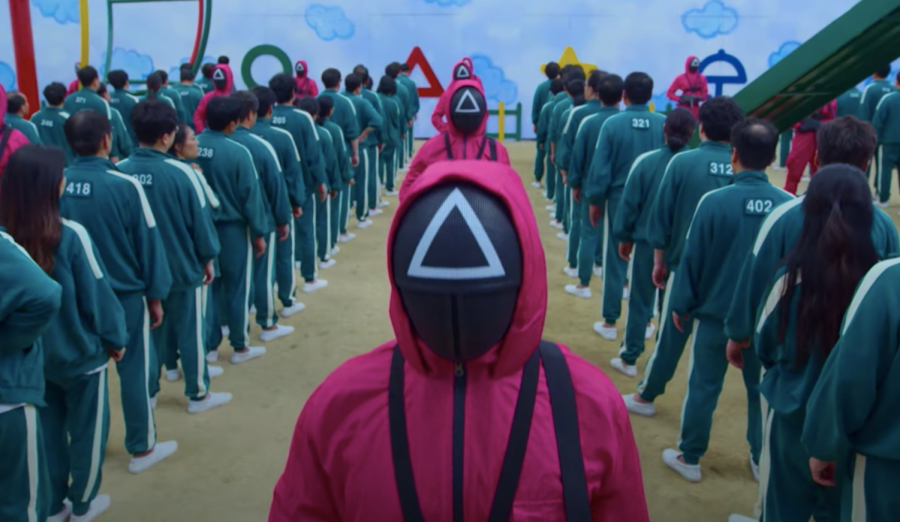Squid Game’s Brutal Exploration of Human Nature
Disclaimer: This article contains spoilers
“You don’t trust people here because you can. You do it because you don’t have anybody else.” — Seong Gi-hun, Episode 4
Human nature cannot easily be defined, however, one recent show arguably did it the best. On Sept. 17, 2021, Netflix released a dark-thriller Korean drama titled Squid Game, a nine episode series that took director Hwang Dong-hyuk 10 years to create. Within a couple weeks, it made Netflix’s #1 in 90 countries. Some people might question why Squid Game became so popular. Was it because of the slow development of realistic and well-written characters? Was it the tension that continuously arose as the stakes became higher? Or was it because of the raw, realistic acting portrayed in the show? It’s all of that, and more.
In a show depicting 456 players who are living on the edge trying to win 45.6 billion won ($38,108,607.47), it is Squid Game’s captivating interpretation that keeps viewers wanting more.
Seong Gi-hun, the protagonist, is not a good man. He’s far from it. He’s addicted to gambling and doesn’t hesitate to steal money from his elderly mother to feed his addiction. He’s short-tempered, and unapologetic. Nevertheless as the show progresses, we see that he’s also kind, forgiving, and determined. He’s a single father who wants to be with his 10-year old daughter, but can’t financially support her. Through his eyes, we are given a gateway to the frustrating world of Gi-hun.
As we continue to watch Gi-hun struggle to get his daughter a proper birthday gift and get chased by debt collectors, it only justifies his desperation when he is invited to play a series of games for a large prize. The invitation to the games itself acts as an inciting incident for the gruesome things to come, and in turn, a greater look into the psyche of Gi-hun and human nature itself.
How Squid Game portrays the essence of human nature isn’t through the external circumstances, but through the reactions of those who are pushed to their breaking points. When you’re pushed into an uncomfortable situation you can’t back out of, what will you do? Because just as Johann Wolfgang von Goethe said, “You can easily judge the character of a man by how he treats those who can do nothing for him.”
A strong example of how Squid Game portrays its views on humanity can easily be found in episode 4, “Stick to the Team.” With many people left who are tired and hungry from the previous game, the staff provides them with nothing but a bottle of water and a hard-boiled egg for dinner. Everyone is obviously upset because it isn’t enough to fill their aching stomachs. However, there is enough for each person to have their share, and if everyone takes what they are given, then everyone can eat. But that doesn’t happen. Instead, five people cut into the back of the line again and took a second helping, leaving five others to starve. When one of them tries to protest, Deok-su, the leader of the five, ends up killing them. This moment emphasizes the selfishness of human nature. It is our nature to be self-preserving, and feed ourselves even if it means starving others, because we care more about our well-being. It is a brutal truth that Squid Game’s’ gives throughout the show. People will cheat and deceive to survive because it is in their nature to protect themselves before others. If we can’t protect ourselves how can we protect others? With varying levels of brutality, Squid Game uses common scenarios in high stakes to portray the flawed levels of humanity. Whether it’s cutting in line, or cheating in a simple game, the show proves that sometimes, humans can be twisted if it means saving themselves.
But there’s a silver lining that Squid Game proves. Even though we tend to be selfish, we are also empathetic. A very good example is the dynamic between Gi-hun and his childhood friend, Sang-woo. In the first few minutes after Gi-hun wakes up inside the bunker where the 6 games will take place, we are introduced to Sang-woo, Gi-hun’s younger childhood friend. Compared to Gi-hun, Sang-woo is more refined. While Gi-hun lives poorly as a chauffeur, Sang-woo graduated at the top of his class from Seoul National University. The two act as a yin and a yang throughout the entire show which reveals their different personalities and moralities.
They are morally grey throughout the show. Sang-woo isn’t afraid to sabotage others if it means that he gets to live. He is a leader that clearly thinks under pressure and is kind when he can afford it. But when it comes down to tricking and hurting others, he won’t hesitate if it means he gets to live to see another day. Gi-hun, on the other hand, has a stronger sense of empathy for others. He feels grief when he sees strangers die, and has a harder time controlling his emotions. Unlike Sang-woo, he won’t push others, but he will trick them to live.
Additionally, their ideologies make them a stark contrast. For example, in the last episode, they are forced to fight to the death for the prize that will change their lives. With nothing but a bloody knife in their hands, they play “Squid Game,” a game they played together when they were kids. As they circle around each other, they both anticipate a different outcome for this game. Gi-hun is willing to give up the money he always wanted if it means they can both walk away alive while Sang-woo thinks that if no one dies, the game would have been pointless and everyone would have died in vain. Their fight is a fight between ideologies. One seeks to be forgiving, kind, and to save others, while the other seeks to be realistic, brutal, and to honor the sacrifices made by reaching the end. They wrestle each other until one is dead. At the end of the fight, the victor might have walked away with the treasure they wanted, but are left feeling as if everything they had endured wasn’t worth it at all.
Through this fight and the interactions of other players, the audience understands humanity’s concepts of greed and self-preservation. They understand the extent people are willing to go to protect themselves in the face of danger, and their actions when the people around them are useless.
Although Squid Game explores human greed and selfishness through its violent portrayal, it also conveys the kindness and empathy of human nature. The fight in the last episode significantly highlights the problems of society while giving the audience hope that with evil comes good. Human nature isn’t black and white and humanity isn’t purely evil or purely kind. Through these twisted scenes, the series encourages us to be kind to each other. We should be fair and forgiving, because ultimately that is human nature: being flawed and striving to do better.











